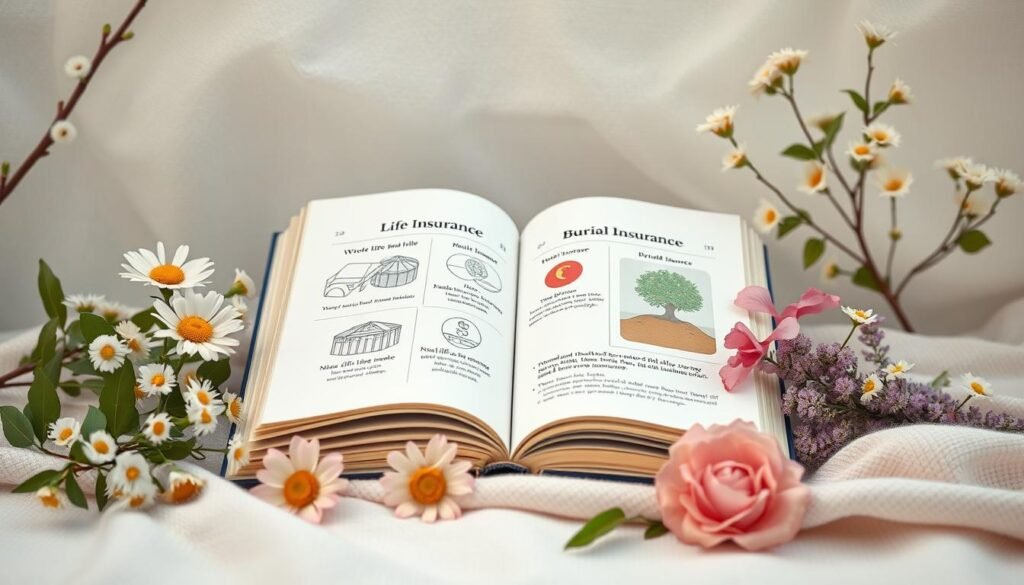Are you looking for a way to protect your financial future without spending a lot? Getting life insurance for seniors is easier than you think. It can cover funeral costs, pay off debts, or help your family financially after you’re gone, offering peace of mind.
Seniors need life insurance to ensure their loved ones are financially secure. It pays for important costs like funeral expenses and bills. This lessens the financial burden on families during tough times. There are many insurance options to fit all needs and budgets, helping everyone find the right coverage.
Companies such as AARP, Globe Life, and Mutual of Omaha provide strong elderly life insurance plans. Knowing your options helps you choose wisely. For example, some policies for a 65-year-old can be over $300 a month. However, Globe Life offers deals with the first month’s coverage at only $1.
Looking at different plans, including those which don’t ask health questions, could lead to the perfect match for you. Pricing for death benefits of $5,000 and $10,000 is reasonable, without needing a medical check-up.
Table of Contents
ToggleKey Takeaways
- Life insurance for seniors ensures financial security for your loved ones.
- Affordable life insurance options are available, even for those with no health questions asked.
- Companies like AARP and Globe Life offer tailored policies at competitive rates.
- Most senior life insurance policies do not require a medical exam.
- It’s crucial to understand coverage types to select a plan that fits your needs and budget.
Understanding Senior Life Insurance
Getting senior life insurance is key to protect your loved ones financially. It’s important to know the different types available to choose the best one. This choice depends on your needs and situation.
Types of Life Insurance Policies
Seniors have several life insurance options:
- Term Life Insurance: These policies last for a set time, like 10, 20, or 30 years. They usually stop before age 80 and can get pricier as you age.
- Whole Life Insurance: This insurance covers you for life. It costs more than term insurance but builds cash value over time.
- Final Expense Insurance: Aimed at covering end-of-life expenses, this option has lower premiums and less coverage.

Why Senior Life Insurance is Important
Life insurance offers many benefits for seniors. It provides essential financial support to your beneficiaries for expenses like funeral costs. Some policies let you use part of the death benefit early if you’re terminally ill. This can help cover care costs.
Common Misconceptions
Let’s clear up some wrong ideas about senior life insurance:
- It’s too costly: While premiums are higher for seniors, there are many options to make it affordable.
- It’s not needed after a certain age: Life insurance is still crucial for financial planning, supporting loved ones, and covering big expenses like final costs and debts.
Many companies offer policies meant for seniors, helping you find one that matches your financial plans and health. Always give accurate medical history and understand the policy fully.
| Insurance Type | Benefits | Coverage Details |
|---|---|---|
| Term Life Insurance | Affordable premiums | Covers a specific term, premiums may increase with age |
| Whole Life Insurance | Accumulates cash value | Lifetime coverage, higher premiums |
| Final Expense | Lower premiums | Covers end-of-life expenses |
Types of Life Insurance for Seniors
Finding the right life insurance for seniors is key. It helps take care of loved ones financially. There are many life insurance types. They include term life insurance for seniors, whole life insurance for seniors, and final expense insurance. Let’s take a look.

Term Life Insurance for Seniors
Term life insurance is a great option for seniors. It covers you for a set period, like 10 to 30 years. It’s more affordable than other types, making it a good choice. For a 60-year-old woman, a $250,000 policy costs about $62.60 per month. For men, it’s $82.70.
By the time you’re 70, the price goes up. It becomes $173.39 for women and $245.01 for men. You can renew it or get a new one when it ends. It’s best for those who want a good rate and don’t need to save money through their policy. Learn more about finding affordable term life insurance for seniors.
Whole Life Insurance for Seniors
Whole life insurance is different. It lasts your whole life and has a cash value that grows. At 60, a woman pays about $324.50 per month for a $100,000 policy. For men, it’s $394.50. At 70, it increases to $580.80 for women and $652.00 for men.
With this insurance, you can take out money or borrow against it. Even though it’s more expensive, it gives lifelong coverage and helps in wealth creation.
Final Expense Insurance
Final expense insurance is for funeral and burial costs. It makes sure these expenses don’t burden your family. It has lower premiums and often doesn’t need a health check. It’s like a small whole life policy with some cash value built up.
Choosing final expense insurance ensures your funeral costs are covered. It eases the financial stress for your loved ones in tough times. For more on life insurance options for seniors and their advantages, check out more insights here.
How Much Coverage Do Seniors Need?
It’s important to find the right coverage amount for seniors. This ensures financial needs are met without paying too much. We’ll discuss what factors into this choice.

Factors to Consider
Think about several things when looking at retirement life insurance:
- Current Income: How much you and your dependents earn affects your insurance needs.
- Outstanding Debts: Consider your debts, like loans or credit card bills, in your plan.
- Future Financial Obligations: Don’t forget future needs, such as college costs for grandkids or healthcare.
Calculating Your Needs
Figuring out your life insurance needs isn’t just about current costs. It’s also planning for your dependents’ future financial support.
Here are some numbers to guide you:
| Policy Type | Coverage Amount | Average Cost |
|---|---|---|
| Whole Life Insurance | $10,000 – $50,000 | Depends on age and health |
| Funeral Expense | N/A | $8,000 – $10,000 |
| Term Life Insurance | Varies | Increases significantly with age |
Knowing how to spread out your coverage helps choose the right policy.
How to Find the Best Life Insurance for Seniors
Looking for the right life insurance for seniors doesn’t have to be hard. It starts with comparing policies from different providers. Some companies make plans just for seniors, making it easy to find a good, affordable policy. Think about how the premiums fit into your budget and the coverage you need.
NerdWallet can help you look at your options. They specialise in breaking down the details of different policies. This way, you can figure out what works best for your money and goals. For example, after 60, finding a 30-year term life policy might be tough. Whole life insurance could be a better choice, even though it costs more.
Getting advice from experts in senior life insurance is also smart. They can give you advice that fits your specific needs. Companies like Atomic Invest, LLC work with several financial services. They give advice that’s not just about insurance but also about planning your finances in general.
Remember, understanding different policies, like simplified and guaranteed issue policies, is important. They usually cost more and cover less than standard policies. Making an informed choice helps protect you and your loved ones financially.
FAQ
Why is life insurance for seniors important?
Life insurance for seniors is vital to help your loved ones financially after you pass away. It helps pay for funeral costs and any outstanding bills. This reduces the financial burden during a tough time.
What are the different types of senior life insurance policies available?
Seniors can choose from various life insurance policies. Options include term, whole life, final expense, and guaranteed issue life insurance. Each offers different coverage to meet various needs.
What is the difference between term life insurance and whole life insurance for seniors?
Term life insurance is less expensive and covers you for a set period. It doesn’t build cash value. Whole life insurance lasts your entire life and builds cash value over time.
How much life insurance coverage do seniors typically need?
The needed coverage varies by each person’s situation. Consider your income, debts, and future obligations. It’s necessary to think about both immediate costs and long-term needs for dependents.
What is final expense insurance?
Final expense insurance is made to cover funeral and burial costs. It ensures these expenses don’t burden your family.
Are life insurance premiums for seniors affordable?
Many think senior life insurance costs too much. Yet, there are affordable options that fit different budgets. Premiums may be higher for seniors but can be manageable.
What are some common misconceptions about senior life insurance?
Many overestimate the cost and undervalue the need for life insurance in later years. However, it can be affordable and is crucial for financial security.
Can seniors with health issues get life insurance?
Yes, seniors with health conditions can still get insured. Guaranteed issue life insurance offers coverage without a medical exam. Though premiums might be higher, it’s an available option.
How can seniors find the best life insurance policy?
To find the best life insurance, compare policies and how premiums match your budget. Think about your coverage needs. Speaking with advisors specializing in senior policies can be beneficial.
What factors should seniors consider when choosing a life insurance policy?
Consider your income, any debts, and your future needs. Think about the coverage type and duration you need. These considerations ensure your policy matches your financial situation without costing too much.



